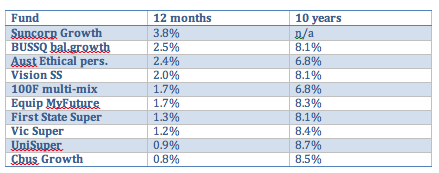Fund performance better than expected… so far
The top 15 super funds all managed to eke out positive returns in the year to June, limping across the line after the most volatile period for markets since the global financial crisis. The top 10, eight of which were not-for-profit funds, ranged between 3.8 per cent and 0.8 per cent for the 12 months.
The top 10 over 10 years had a much narrower dispersion, 8.8 per cent annualised to 8.1 per cent, according to the interim figures announced last week (July 17) by SuperRatings. They were all not-for profit funds.
The research’s report says: “As funds finalise their reporting for June 2020, the fallout from the COVID-19 crisis is clear, but far from the sea of red that members and commentators may have expected back in March. For members invested in any of the top 15 performing balanced options, the past year has netted a slim but positive return compared to the estimated median return of minus 1.2 per cent.”
Top 10 balanced fund options for 12 months and 10-year returns
The top 10 fund balanced options over 10 years, annualised and in order, were: AustralianSuper (8.8 per cent); UniSuper (8.7 per cent); HostPlus (8.6 per cent); Cbus (8.5 per cent); CareSuper and VicSuper (both 8.4 per cent); Equip (8.3 per cent); QSuper (8.2 per cent); Vision SS and Mercy Super (both 8.1 per cent).
Kirby Rappell, SuperRatings executive director, said: “Super is a long-term game, so members should avoid chasing short-term results and ensure they are invested in a quality fund with the right investment strategy that is well positioned to deliver for their needs over the course of their working life.” Interestingly, only half of the top-performing funds over 12 months were among the top-performing funds over 10 years, highlighting the difficulty for investment strategies to perform well in differing market conditions over a longer term.
“It was pleasing to see 15 out of the 50 options in the SR50 Balanced Index generate a positive return in the 2019-20 financial year, which speaks to the quality of funds available to members,” Rappell said. “Managing risks while delivering a positive return in this environment has been a real challenge, and this is likely to continue through the rest of 2020.”
The report notes that, given the success of super over the past 10 years in accumulating wealth, members will feel the bumps more when markets go down. “Prior to Covid-19, we saw the industry average account balance rise over $100,000, compared to around $30,000 during the GFC,” Rappell said. “This means that, on an absolute basis, members will see their balance move around a lot more than they have previously. Funds have done an excellent job of both managing risk and educating their members on these issues, but more can be done in this space.”
– G.B.










